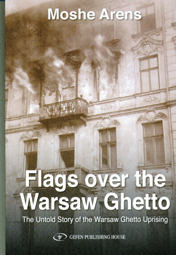Flags over the Warsaw Ghetto: The Untold Story of the Warsaw Ghetto Uprising by Moshe Arens, Geffen Publishing House, 406 pages including index and appendices, ISBN 9652295279978, price not listed.
By Donald H. Harrison

 SAN DIEGO–Given Moshe Arens’ credentials as a serious student of world affairs, who had served both as defense minister and as foreign minister for the Israeli government, as well as its ambassador to the United States, this book deserves to be taken seriously. However, given the fact that Arens also is affiliated with the political movement begun by Ze’ev Jabotinsky, furthered by Menachem Begin, and now headed by Binyamin Netanyahu, we must also be aware that his account, like those he criticizes within this book, may be the product of some subjectivity.
SAN DIEGO–Given Moshe Arens’ credentials as a serious student of world affairs, who had served both as defense minister and as foreign minister for the Israeli government, as well as its ambassador to the United States, this book deserves to be taken seriously. However, given the fact that Arens also is affiliated with the political movement begun by Ze’ev Jabotinsky, furthered by Menachem Begin, and now headed by Binyamin Netanyahu, we must also be aware that his account, like those he criticizes within this book, may be the product of some subjectivity.
In essence, Arens contends that the Revisionist movement, which found expression throughout the world in the Betar youth groups, was purposely excluded from the Jewish resistance in Warsaw–a reflection of longstanding ideological rivalries with the center-to-left ZOB coalition led by Mordecai Anielewicz. Arens mourns the fact that fellow Jews could not put ideological rivalries aside in face of the Nazis’ determination to murder every last Jew in the Warsaw ghetto.
As a result, he reports, the Revisionists formed a separate fighting group known as the ZZW. which independently resisted the Nazis, most particularly in a four-day battle that commenced with the raising of a Zionist flag and a Polish flag together atop a Jewish-defended building on Muranowski Square. The flags could be seen not only in the Jewish ghetto but also in the “Aryan” parts of the city, prompting considerable alarm, even panic, among the Nazi overlords. Could the flags, as intended, spark a revolution among the general Polish population? The Nazis, through superior force, eventually overwhelmed the building’s defenders and removed the symbols. There was no general Polish uprising.
Arens, utilizing German, Polish and Jewish sources, re-creates for the readers the battle in the ghetto, which resulted in the prompt execution of many fighters and the arrests of tens of thousands of other Jews and their eventual transport to the gas chambers. Compared to this, German losses were negligible. The Warsaw Ghetto battle was a complete military disaster for the Jews — only psychologically could it in any way be considered a victory. Aware that transport from the ghetto meant their deaths, the doomed Jews decided to strike a blow for Jewish honor by resisting the Germans with the few weapons that had been smuggled into the ghetto. They hoped in vain it would be an example to captive peoples everywhere.
In writing this book, Arens seeks to claim a major place for the ZZW in the achievement of Jewish honor in the face of overwhelming military odds. For the most part, those who lived to tell their personal stories of the revolt in the Warsaw Ghetto were affiliated with the ZOB, Arens contends. Either because they did not know of the separate ZZW campaign, or dismissed it for the same ideological reasons that prompted ZOB to exclude ZZW in the first place, most historical accounts omit any mention of the ZZW.
And although there are as many indexed citations for ZZW leader Pawel Frenkel as there are for ZOB leader Anielewicz, both of whom were killed in the fighting, Frenkel remains more of an elusive figure — a name rather than a personality in Arens’ narrative.
The irony is that in order to document the ZZW’s contributions to the fight against the Nazis, Arens had to turn to the field reports and war crimes trial testimony of the Nazi commander Juergen Stroop, feeling that, in this case at least, the Nazis had a more unbiased view. To them, Jews were Jews and all were to be liquidated.
In the battle for the verdicts of historians, Arens has struck a blow for ZZW, However, the very prominence which makes us take him seriously also diminishes his standing as an impeccably objective historian.
We should hope that sometime in the future, some prominent historian of the Holocaust will seriously examine the account in Arens’ books, as well as in preceding books by ideological opponents, and seek to develop an even more authoritative account.
In the meantime, Arens can take pleasure in having successfully raised the issue, even if he didn’t settle it.
*
Harrison is editor of San Diego Jewish World. He may be contacted at donald.harrison@sdjewishworld.com